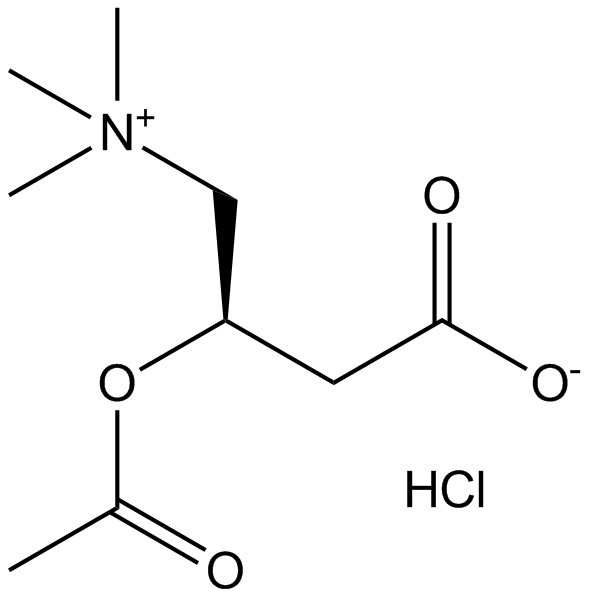L-Acetylcarnitine (hydrochloride) (Synonyms: Acetyl-L-Carnitine,ALCAR) |
| Catalog No.GC13314 |
Acetyl-L-carnitine (O-Acetyl-L-carnitine) hydrochloride is a blood-brain permeable acetyl ester of the amino acid L-carnitine found in the body.
Products are for research use only. Not for human use. We do not sell to patients.

Cas No.: 5080-50-2
Sample solution is provided at 25 µL, 10mM.
L-Acetylcarnitine, also named as ALCAR, an acetylated form of L-carnitine, fosters the uptake of acetyl coenzyme A (CoA) into mitochondria during fatty acid oxidation, raises the production of acetylcholine, and triggers the synthesis of membrane phospholipid and protein. ALCAR has been explored for use as an acetylcholine mimic as well as in targeting cardiovascular pathologies. Acetyl-CoA is the primary substrate for the tricarboxylic acid cycle in mitochondria and modulates the reserves of free CoA which is essential to the function of the tricarboxylic acid cycle.
In vitro: The expression of tumor antigen CA-125 in ovarian cancer cells was not affected by ALCAR. Comparing to the control, the growth of SKOV-3 cells was remarkably decreased when incubated with ALCAR. The proliferation of SKOV-3 cells was decreased slightly but significantly when cells were incubated at higher ALCAR concentrations. In addition, ALCAR had no effect on the expression of the nerve growth factor receptors on SKOV-3 or OVCAR-3 ovarian cancer cells [1].
In vivo: Male Flinders Sensitive Line (FSL) rats and male CD1 mice, exposed to model genetic and environmentally induced depression, respectively, were injected intraperitoneally with ALCAR 100 mg/kg for 21 days. ALCAR, as a long-lasting and rapid antidepressant, functioned via the epigenetic regulation of type 2 metabotropic glutamate (mGlu2) receptors in FSL rats and in mice. Additionally, ALCAR raised the transcription of Grm2 gene encoding for the mGlu2 receptor via increasing the levels of acetylated H3K27 bound to the Grm2 promoter and gaining the acetylation of NF-KB-p65 subunit. [2].
References:
[1]. Engle, D., Belisle, J., Gubbels, J., Petrie, S., Hutson, P., Kushner, D., & Patankar, M. Effect of acetyl-l-carnitine on ovarian cancer cells' proliferation, nerve growth factor receptor (Trk-A and p75) expression, and the cytotoxic potential of paclitaxel and carboplatin. Gynecologic Oncology. 2009; 112(3): 631-636.
[2]. Nasca, C., Xenos, D., Barone, Y., Caruso, A., Scaccianoce, S., & Matrisciano, F. et al. L-acetylcarnitine causes rapid antidepressant effects through the epigenetic induction of mGlu2 receptors. Proceedings of The National Academy of Sciences. 2013; 110(12): 4804-4809.
Average Rating: 5 (Based on Reviews and 2 reference(s) in Google Scholar.)
GLPBIO products are for RESEARCH USE ONLY. Please make sure your review or question is research based.
Required fields are marked with *




















